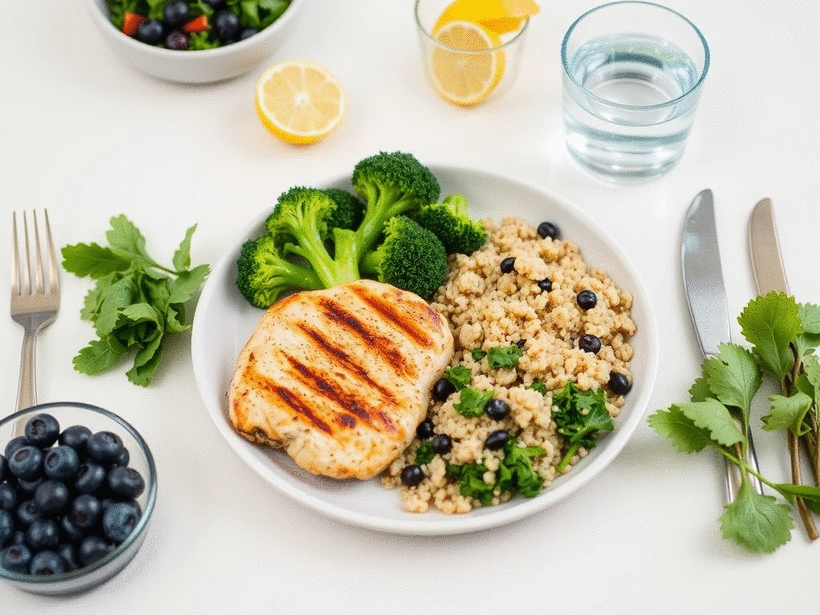Diabetes-Friendly Meal Planning Tips

What if a meal plan could not only help manage diabetes but also enhance your overall quality of life? The truth is, understanding how to eat effectively within such a plan can empower you to take control of your health. Let's explore the essential components of a diabetes-friendly meal plan.
What You Will Learn
- A diabetes-friendly meal plan balances carbohydrates, proteins, and healthy fats while incorporating a variety of fruits and vegetables.
- Understanding blood sugar control can prevent long-term complications and improve overall health and energy levels.
- Insulin plays a crucial role in regulating blood sugar; managing carbohydrate intake can help improve insulin efficiency.
- Creating a weekly meal prep routine can simplify healthy eating and reduce the temptation of unhealthy choices.
- Choosing nutritious snacks that stabilize blood sugar levels, such as raw vegetables with hummus or Greek yogurt with berries, is vital for maintaining energy throughout the day.
- Mindful cooking methods, such as steaming and grilling, can enhance nutrient density, contributing positively to blood sugar management.
Key Pillars of a Diabetes-Friendly Meal Plan
A well-structured diabetes-friendly meal plan balances essential nutrients to help manage blood sugar levels effectively. Below are the core components and their impact.
Meal Plan Focus Balanced Nutrition
- •Carbohydrates
- •Proteins
- •Healthy Fats
- •Fruits & Veggies
Why It Matters Blood Sugar Control Benefits
- •Prevents Complications
- •Boosts Energy Levels
- •Reduces Spikes/Drops
- •Supports Overall Health
Key Hormone Insulin's Vital Role
- •Regulates Blood Sugar
- •Enables Glucose Uptake
- •Impacted by Diet
- •Improved by Activity
Actionable Advice Maintaining a Healthy Diet
- •Weekly Meal Prep
- •Smart Snacking
- •Healthy Cooking Methods
- •Hydration
Understanding the Basics of a Diabetes-Friendly Meal Plan
When it comes to managing diabetes, understanding a diabetes-friendly meal plan is crucial. This approach focuses on maintaining balanced nutrition while keeping blood sugar levels stable. A well-structured meal plan helps you make informed food choices that align with your health goals. As a physician dedicated to empowering individuals with diabetes knowledge, I can assure you that creating an effective meal plan doesn't have to be complicated!

At What Is Diabetes, I strive to provide clear insights into what constitutes a diabetes-friendly meal plan. It includes a variety of foods that provide essential nutrients while carefully considering carbohydrate intake. By focusing on whole foods and minimizing processed options, individuals can enjoy their meals without compromising their health.
What is a Diabetes-Friendly Meal Plan?
A diabetes-friendly meal plan is tailored specifically for individuals with diabetes to help manage their blood sugar levels effectively. This type of plan emphasizes a balance of carbohydrates, proteins, and healthy fats while incorporating a wide range of fruits and vegetables. It allows flexibility, catering to personal preferences and dietary restrictions, making meals enjoyable instead of restrictive.
- Incorporates whole grains like brown rice and quinoa
- Includes lean proteins such as chicken, fish, and legumes
- Focuses on healthy fats from sources like avocados and nuts
- Emphasizes the importance of fruits and vegetables for vitamins and minerals
By following a structured meal plan, you not only learn how to make healthier choices but also gain confidence in managing your diabetes. Remember, it’s about finding what works best for you!
Why Blood Sugar Control is Essential for Diabetes Management
Effective blood sugar control is at the heart of diabetes management. Elevated blood sugar levels can lead to serious health complications over time, including heart disease, kidney issues, and nerve damage. That’s why it’s vital to monitor your blood sugar regularly and adapt your meal plan accordingly. Understanding how to manage your diet for blood sugar control can significantly improve your long-term health, as highlighted by resources from the National Institute of Diabetes and Digestive and Kidney Diseases.
- Helps prevent long-term complications
- Improves overall health and energy levels
- Reduces the risk of sudden blood sugar spikes and drops
Understanding how different foods affect your blood sugar can empower you to make better choices. By prioritizing blood sugar control, you're taking proactive steps toward a healthier future!
The Role of Insulin in Blood Sugar Regulation
Insulin plays a critical role in regulating blood sugar levels. It’s a hormone produced by the pancreas that helps cells absorb glucose from the bloodstream. For individuals with diabetes, the body either does not produce enough insulin or cannot use it effectively, leading to elevated blood sugar levels.
This is where a diabetes-friendly meal plan comes into play. By monitoring carbohydrate intake and timing meals appropriately, we can support our bodies in utilizing insulin more efficiently. Here are some key points to consider:
- Balancing carbohydrate intake throughout the day
- Incorporating regular physical activity to improve insulin sensitivity
- Staying hydrated to support metabolic processes
By understanding insulin’s role, you can take better control of your diabetes management. Remember, knowledge is power, and with the right tools, you can lead a healthier, more fulfilling life!
Interactive Poll
What do you find most challenging about maintaining a diabetes-friendly meal plan? Select one of the options below:
Frequently Asked Questions About Diabetes-Friendly Meal Plans
Q1: What are the main components of a diabetes-friendly meal plan?
A diabetes-friendly meal plan focuses on balancing carbohydrates, proteins, and healthy fats, alongside a generous intake of fruits and vegetables. This approach aims to stabilize blood sugar levels and provide essential nutrients.
Q2: Why is blood sugar control so important for individuals with diabetes?
Effective blood sugar control is crucial for preventing long-term complications such as heart disease, kidney issues, and nerve damage. It also helps improve overall health and maintains stable energy levels throughout the day.
Q3: How does insulin affect blood sugar, and how can diet help?
Insulin is a hormone that helps cells absorb glucose from the bloodstream. For people with diabetes, the body either doesn't produce enough insulin or can't use it effectively. A diabetes-friendly meal plan helps by balancing carbohydrate intake and timing meals to support the body in utilizing insulin more efficiently.
Q4: What are some practical tips for maintaining a diabetes-friendly diet?
Key tips include creating a weekly meal preparation routine to save time and avoid unhealthy choices, choosing snacks that stabilize blood sugar (like raw vegetables with hummus or Greek yogurt with berries), and opting for healthy cooking methods such as steaming, roasting, or grilling.
Q5: Are there specific cooking methods recommended for a diabetes-friendly diet?
Yes, cooking methods that help preserve nutrient density are recommended. These include steaming, roasting, or grilling vegetables and lean proteins. It's advisable to use minimal healthy oils (like olive oil) and avoid frying to reduce unwanted calories and fats.
Practical Tips for Maintaining a Diabetes-Friendly Diet
Staying on track with a diabetes-friendly diet can sometimes feel challenging, but with the right strategies in place, it can become a seamless part of your routine. Here are some practical tips that can help you maintain a balanced diet while managing your blood sugar levels effectively!
One of the most effective ways to ensure you eat healthily is to create a weekly meal preparation routine. By setting aside time to plan and prep your meals, you’ll save time during the week and reduce the temptation of reaching for less healthy options. To better understand how to plan nutritious meals, consider exploring resources like Plant-Powered Diabetes Meal Planning from the U.S. Department of Veterans Affairs.

Creating a Weekly Meal Preparation Routine
- Set aside a specific day and time for meal prep.
- Choose recipes that can be made in batches and stored for the week.
- Use a grocery list to avoid impulse purchases.
- Involve family members in the preparation process for support and fun!
Preparation doesn’t have to be a chore! I encourage you to find recipes that you enjoy. This will make the process more enjoyable and help you stay committed to your meal plan. You can even try involving your family in the prep—turning it into a fun cooking time together!
Incorporating Snacks that Support Blood Sugar Levels
Snacking is an important part of maintaining energy levels throughout the day, especially for those managing diabetes. Make sure your snacks are not only satisfying but also help to stabilize your blood sugar levels. Here are some great options:
- Raw vegetables with hummus
- Greek yogurt with berries
- Nuts and seeds
- Whole grain crackers with avocado
By choosing snacks that are high in protein and fiber, you can keep your blood sugar steady and avoid those pesky energy crashes. Remember to keep portion sizes in check; even healthy snacks can add up quickly!
Cooking Methods and Their Effects on Nutrient Density
The way you prepare your meals can greatly affect their nutritional value. Opting for healthier cooking methods can help maintain the nutrient density of your food, which is essential for blood sugar control. Here are some cooking techniques to consider:
- Steaming or roasting vegetables to retain nutrients
- Grilling lean proteins to reduce fat content
- Using minimal oil or opting for healthier oils, like olive oil
- Avoiding frying, which can add unwanted calories and fats
By being mindful of your cooking methods, you can create meals that not only taste great but also contribute positively to your overall health. When I prepare meals, I love experimenting with different techniques to bring out the best flavors while keeping things nutritious!
Recap of Key Points
Here is a quick recap of the important points discussed in the article:
- A diabetes-friendly meal plan focuses on balancing carbohydrates, proteins, and healthy fats while incorporating a variety of fruits and vegetables.
- Effective blood sugar control is essential for preventing long-term complications and improving overall health.
- Understanding the role of insulin can help in managing blood sugar levels by balancing carbohydrate intake and timing meals effectively.
- Meal preparation routines can simplify the process of maintaining a diabetes-friendly diet and reduce the temptation of unhealthy options.
- Choosing snacks high in protein and fiber can help stabilize blood sugar levels and maintain energy throughout the day.
- Healthy cooking methods, such as steaming or grilling, can preserve nutrient density and enhance the nutritional value of meals.









